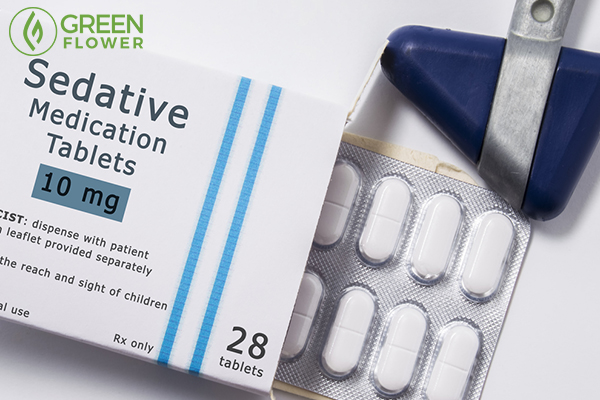
The verdict is out: Americans are popping more legal pills than ever before.
In the past two decades, the number of drug prescriptions has increased by 85 percent.
Yet, in 2013, an estimated 128,000+ prescription drug takers died from adverse drug reactions.
This means that prescription drugs almost rival stroke in terms of overall casualties.
The irony?
We’re taking more “medicine” than ever, but we just keep getting sicker.
While humankind has certainly made major strides in treating infectious disease and helping us live longer, rates of debilitating, chronic disease have only increased along with the rise of medications.
Legal drugs are failing to offer consumers a guarantee of a long, happy, and high-quality life.
Even with so many new prescription drugs, rates of diabetes, Alzheimer’s, autism, autoimmune disease, and mental health ailments continue to increase.
Cannabis, meanwhile, can help with a lot our health issues, and has yet to be linked to even a single death and has a high margin of safety.
While only you and your doctor can decide what treatment plan is best for your particular condition, here’s how many people die from five popular legal drugs:
1. Opioid Painkillers

By now, the opioid epidemic has been well-publicized by the media.
Opioid painkillers are among the top 25 most prescribed drugs, yet they are responsible for 64,000 overdose deaths in America alone each year.
As a Vox report points out, this is more U.S. casualties than accrued in the Vietnam war. While an estimated 58,220 U.S. soldiers died in combat, one single year of opioid abuse tops that number by nearly 6,000 people.
Still, opioid painkillers are legal and heavily prescribed. In fact, while the number of opioid painkillers has dropped from 81 per 100 patients to 70 per 100 patients, the numbers of prescriptions are still quite high given the extreme side effects.
One of the most prevalent opioid painkillers is OxyContin, a drug which has earned one family, The Stacklers, a position among the top 25 richest families in the United States.
Despite dozens of lawsuits from cities and states regarding OxyContin’s marketing practices, the drug continues to be sold, putting more money in the Stacklers’ bank accounts, though the opioid epidemic costs the U.S. economy an estimated $500 billion or more annually.
2. Humira
Humira (Adalimumab) was rated the highest grossing drug in 2016, bringing in around $16 billion per year.
The drug belongs in a category of medications referred to as TNF blockers, acting as powerful anti-inflammatory medication that is used to treat conditions such as rheumatoid arthritis, Crohn’s disease, plaque psoriasis, and more.
Thus far, Humira has not been statistically linked to increased death rates in either the short or long term.
However, during clinical trials in Italy, six patients of 515 died while testing the medication.
In 2008, the FDA warned that Humira and other TNF blockers may put patients at greater risk from life-threatening fungal infections.
In fact, 45 people were found to have died as a result of infection worsened by taking drugs like Humira.
Further, taking Humira long term was associated with an increase in developing a rare, fast-spreading, and fatal form of blood cancer. The FDA warns:
“Some people receiving TNF blockers including HUMIRA developed a rare type of cancer called hepatosplenic T-cell lymphoma. This type of cancer often results in death.”
While there earlier studies suggest that it is unlikely that Humira increases death in the short run, there is no doubt that it runs the risk of decreasing quality of life and potentially shortening lifespan in the long run.
3. Benzodiazepines

Benzodiazepines are sedative medications often prescribed for anxiety and other mental health conditions. These tranquilizers are sold under well-known brand names like Ativan, Xanax, and Valium.
While side effects of benzodiazepines include weakness, confusion, sedation, constipation, headache, depression, and agitation, these chill pills are among some of the most commonly prescribed drugs in the United States.
Over the past 20 years, prescriptions for benzodiazepines have more than quadrupled.
As one might expect, with this increase in use comes an increase in overdose deaths. In 2015, the National Institute on Drug Abuse estimates that nearly 9,000 reported deaths were caused by benzodiazepine overdose.
Back in 2003, benzodiazepine medications accounted for over 31% of all fatal drug overdoses.
The number of deaths caused by these legal drugs is lower than the overall number of deaths caused by opioids but greater than those caused by illicit cocaine.
4. Antidepressant medications
While antidepressant medications are intended to reduce the risk of suicide, they are the method of choice for 20 percent of people who attempt suicide in the United Kingdom. They also account for 20 to 30 percent of non-fatal overdose admissions.
Why? Because, unlike cannabis, overdosing on antidepressants can kill you.
However, you don’t have to overdose for antidepressants to cause harm.
Research published in the fall of 2017 unveiled that the most common type of antidepressant, selective serotonin reuptake inhibitors (SSRIs) may increase your overall risk of death.
While the feel-good neurotransmitter serotonin is often associated with brain health, serotonin actually has a vast number of functions in the body.
The research found that antidepressant consumers have a whopping 33 percent higher risk of death, and 14 percent higher risk of cardiovascular events.
This is problematic because one in eight Americans takes antidepressant medications.
To make matters worse, a Danish study involving over 18,000 people and reviewing 70 different studies found that antidepressant medications can double the risk of suicide and aggressive behavior in those under 18 years old.
The same risk was not found in adults, though the study’s researchers question whether misreporting of research is to blame for the seeming lack of correlation.
“The analysis suggests that clinical study reports,” begins Tarang Sharma, of the Nordic Cochrane Center in Denmark, “on which decisions about market authorization are based, are likely to underestimate the extent of drug-related harms.”
According to the report, some unnamed manufacturers of antidepressant medications failed to report suicide attempts and suicidal ideation that occurred during or following the trials.
5. Adderall and Vyvanse

Along with antidepressants, ADD/ADHD medications have been included among the ten medicines most likely to cause violence.
If that statistic isn’t enough to make you pause, overdosing on Adderall or the increasingly popular Vyvanse can lead to sudden death.
According to the FDA, those who fatally overdose on prescription amphetamines will likely experience convulsions and coma before.
Other severe side effects include seizures, heart attack, psychosis, severe insomnia, and depression.
Long-term use of drugs like Adderall and Vyvanse have been linked to malnutrition, which is problematic as the medication is often prescribed to young adolescents aged 12 and over. In 2014, an estimated 1.6 million people took the drug.
According to the CDC, the number of overdose deaths from psychostimulants (excluding cocaine) has more than doubled since 2010.
In fact, in 2010, only 5 percent of all drug overdoses were due to psychostimulant overdose. Yet, by 2015, that number rose to 11 percent.
In 2015, Vyvanse outperformed Viagra as one of the 15 top grossing drugs. The amfetamine earned over $2 billion in sales that year.
– This article was originally posted at Green Flower
About CannabisNewsWire
CannabisNewsWire (CNW) is an information service that provides (1) access to our news aggregation and syndication servers, (2) CannabisNewsBreaks that summarize corporate news and information, (3) enhanced press release services, (4) social media distribution and optimization services, and (5) a full array of corporate communication solutions. As a multifaceted financial news and content distribution company with an extensive team of contributing journalists and writers, CNW is uniquely positioned to best serve private and public companies that desire to reach a wide audience of investors, consumers, journalists and the general public. CNW has an ever-growing distribution network of more than 5,000 key syndication outlets across the country. By cutting through the overload of information in today’s market, CNW brings its clients unparalleled visibility, recognition and brand awareness. CNW is where news, content and information converge.
To receive instant SMS alerts, text CANNABIS to 21000 (U.S. Mobile Phones Only)
For more information please visit https://www.cannabisnewswire.com
Please see full terms of use and disclaimers on the CannabisNewsWire website applicable to all content provided by CNW, wherever published or re-published: http://CNW.fm/Disclaimer
Do you have a questions or are you interested in working with CNW? Ask our Editor
CannabisNewsWire (CNW)
Denver, Colorado
www.cannabisnewswire.com
303.498.7722 Office
Editor@CannabisNewsWire.com
This article contains Third-Party Content submitted by third parties, including articles submitted through the CNW Premium Partnership Program. All opinions, statements and representations expressed by such third parties are theirs alone and do not express or represent the views and opinions of CNW or its affiliates and owners. Content created by third parties is the sole responsibility of such third parties, and CNW does not endorse, guarantee or make representations concerning the accuracy and completeness of all third-party content. You acknowledge that by CNW providing you with this internet portal that makes accessible to you the ability to view third-party content through the CNW site, CNW does not undertake any obligation to you as a reader of such content or assume any liability relating to such third-party content. CNW expressly disclaims liability relating to such third-party content. CNW and its members, affiliates, successors, assigns, officers, directors, and partners assume no responsibility or liability that may arise from the third-party content, including, but not limited to, responsibility or liability for claims for defamation, libel, slander, infringement, invasion of privacy and publicity rights, fraud, or misrepresentation, or an private right of action under the federal securities laws of the United States or common law. Notwithstanding the foregoing, CNW reserves the right to remove third-party content at any time in its sole discretion.



















